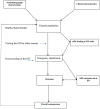Understanding adverse drug-related emergency department visits: development of a conceptual model through a systematic review
- PMID: 31258886
- PMCID: PMC6591658
- DOI: 10.1177/2042098619852552
Understanding adverse drug-related emergency department visits: development of a conceptual model through a systematic review
Abstract
Background: The burden of adverse drug event (ADE)-related emergency department (ED) visits is increasing despite several preventive measures. The objective of this paper was to develop and validate a conceptual model for a better understanding of ADE-related ED visits and to guide the design and implementation of effective interventions.
Methods: The development of the model involved a systematic review of the literature using PubMed and Embase databases. Studies reporting the risk factors associated with ADE-related ED visits were included. The methodological qualities of the included studies were assessed using the Mixed Methods Appraisal Tool (MMAT). The model was mapped and validated using face and content validity by an expert panel. Deficiencies and targeted interventions were identified, and steps for the design and implementation were recommended.
Results: The literature search generated 1361 articles, of which 38 were included in the review; 41 risk factors associated with ADE-related ED visits were identified. All factors were mapped, and the model was validated through face and content validity. The model consisted of six concepts related to sociodemographic factors, clinical factors, ADE-related to ED visits, ADE while in the ED, outcomes, and consequences. Interventions could be targeted at the factors identified in each concept to prevent ADE-related ED burden.
Conclusion: A conceptual model to guide the successful design and implementation of strategies to prevent ADE-related ED visits and the occurrence of ADE at ED was developed. Clinicians should take these factors into consideration to prevent untoward events, especially when treating high-risk patients.
Keywords: adverse drug events; drug-related problem; emergency department; pharmacoepidemiology.
Conflict of interest statement
Conflict of interest statement: The authors declare that there is no conflict of interest.
Figures
References
-
- World Health Organization. The world medicines situation, http://apps.who.int/medicinedocs/pdf/s6160e/s6160e.pdf (2004, accessed 12 March 2017).
-
- Kaufman DW, Kelly JP, Rosenberg L, et al. Recent patterns of medication use in the ambulatory adult population of the United States: the Slone Survey. JAMA 2002; 287: 337–344. - PubMed
-
- Ombengi D, Ndemo F, Noreddin AM, et al. The disease burden and the extent of drug therapy problems in an underserved minority population receiving medication therapy management at an ambulatory care free clinic. J Pharm Care Health Syst 2016; 157.
-
- Phillips AL, Nigro O, Macolino KA, et al. Hospital admissions caused by adverse drug events: an Australian prospective study. Aust Health Rev 2014; 38: 51–57. - PubMed
Publication types
LinkOut - more resources
Full Text Sources



